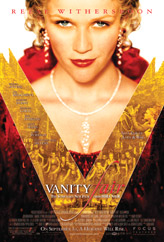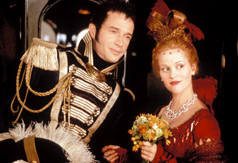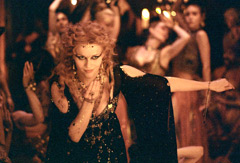| Vanity Fair |
| |
 |
UK/USA, 2004. Rated PG-13. 137 minutes.
Cast: Reese Witherspoon, James Purefoy, Romola Garai, Gabriel Byrne, Jonathan Rhys Meyers, Bob Hoskins, Rhys Ifans, Eileen Atkins, Jim Broadbent, Geraldine McEwan, Douglas Hodge, Tony Maudsley, Sophie Hunter
Writers: Julian Fellowes, Matthew Faulk & Mark Skeet, based on the novel by William Makepeace Thackeray
Original Music: Mychael Danna
Cinematography: Declan Quinn
Producers: Janette Day, Donna Gigliotti, Lidia Dean Pilcher
Director: Mira Nair
LINKS |
Read the AboutFilm interview with Mira Nair.
 n ambitious but incoherent period epic from Indian director Mira Nair (Monsoon Wedding, Mississippi Masala), Vanity Fair strives to be equal parts House of Mirth and Jane Austen (think Sense & Sensibility and Mansfield Park), but succeeds at neither. Vanity Fair becomes a struggle to follow, and that makes it a struggle to enjoy.
n ambitious but incoherent period epic from Indian director Mira Nair (Monsoon Wedding, Mississippi Masala), Vanity Fair strives to be equal parts House of Mirth and Jane Austen (think Sense & Sensibility and Mansfield Park), but succeeds at neither. Vanity Fair becomes a struggle to follow, and that makes it a struggle to enjoy.
Vanity Fair concerns plucky Becky Sharpe, the orphaned child of a starving artist and a French chorus girl. Raised in an academy for girls (where she is forced to work), she makes her escape by accepting a post as a country governess not far from the home of her best friend Amelia Sedley (Romola Garai), only to find the estate, that of Sir Pitt Crawley (Bob Hoskins), a complete shambles.
Not a problem. Wherever she goes, Becky wins friends and influences people, including Amelia's brother Jos (Tony Maudsley). Becky soon restores order to the Crawley estate. Her competence and ready wit attract the interest of Crawley's outspoken, rich half-sister Matilda (Eileen Atkins), while her beauty attracts the interest of Crawley's dashing younger son Rawdon (James Purefoy). Becky moves into Matilda's London household, where she and Rawdon continue an ill-advised flirtation. Matilda talks grandly about how she adores “imprudent matches,” but (as Rawdon puts it) despite talking like Oliver Cromwell, she thinks like Charles I. Meanwhile, Amelia pines for George Osborne (Jonathan Rhys Meyers), the son of a prosperous merchant (Jim Broadbent). George takes an immediate dislike to Becky and threatens to break off his engagement to Amelia if Jos pursues the socially unsuitable Becky.

James Purefoy and Reese Witherspoon star in Mira Nair's Vanity Fair. |
Replete with lines like, “I had thought she was a mere social climber—I see now she's a mountaineer,” the first half of Vanity Fair seems like quintessential Austen. Victimized by prejudiced gossip, the plucky Becky seems the quintessential Austen heroine. Your instinct is to immediately like her as much as you would Elizabeth Bennett, or Fanny Price, or one of the Dashwood girls. Vanity Fair, however, is not Austen.
Vanity Fair is the work of social satirist William Makepeace Thackeray, who subtitled his 1847 book, “A novel without a hero.” Consider that fair warning. The very first sequence of the film, set in 1802, establishes what this story is really about and admonishes you not to expect an easy ending. In it we meet Becky as a child playing with marionettes and saying the line, “You cannot flaunt the rules of good society” (a scene referenced later when a character describes society as a “tawdry puppet play”). Then, Becky agrees to sell the only portrait of her mother to the Marquess of Steyne (Gabriel Byrne) once the price rises enough. This girl can be bought.
Becky is indeed who her critics say she is—a determined social climber intent on inserting herself into high society. She targets Amelia's overweight and none-too-bright brother immediately upon meeting him, and would marry him in a second to improve her station—that's the truth of Becky. Were it not for George's unwelcome intercession, Vanity Fair would end right there, after fifteen minutes. Instead, Becky must navigate a much harder course. The way she winds up in Matilda's household is actually quite calculated. None of this means that Becky is all bad—she genuinely falls in love, she genuinely cares for Amelia—but she is no angel.
Though your sympathy for Becky may wane once her character flaw becomes apparent, this is a far more complex heroine than you'd get from Austen, and therefore potentially far more interesting. Unfortunately the film runs into trouble shortly after Napoleon escapes from his prison in Elba, and Rawdon and George are called to fight in Belgium. As Napoleon approaches his Waterloo the film does as well. After that point, the story becomes intensely confusing and diffuse. Time moves faster as the film skips forward in increasingly larger steps. Crucial scenes appear to be missing. For example, after Waterloo, you are desperate to know whether Rawdon has survived the battle, but the film neglects to mention this detail until much later. Instead Vanity Fair explores the subplot between Amelia and George, and a character named Dobbin (Rhys Ifans).
Who the hell is Dobbin, you might ask. (I certainly did.) He appears here and there briefly, and then suddenly he's a central character. Dobbin had been marginalized in the original version of the script by Matthew Faulk and Mark Skeet, but Nair and screenwriter Julian Fellowes (Gosford Park) insisted on restoring him as the “moral center” of the story. The trouble with Dobbin, who harbors an unrequited love for Amelia, is that he has nothing to do with Becky, ostensibly the protagonist. Regardless of Dobbin's role in the novel, he is utterly incidental to the Becky's story in the film. His scenes are irrelevant to Becky's character development.
When Nair focuses on Dobbin's choices, she is not focusing on Becky's choices, which are treated more and more superficially as the story progresses. Why does Becky fall so utterly under the spell of the Marquess of Steyne? Okay, he's powerful and she's broke, but she's a smart cookie—surely she sees what she's getting herself into? What of her feelings for her husband, now reduced to an afterthought? Witherspoon's technically irreproachable but rather cool performance does not shed light where the script is deficient. When Becky watches her son take his first steps, Witherspoon gives us a little twist of a half grin—what the heck is that?

Reese Witherspoon performs a provocative dance for the King in Mira Nair's Vanity Fair. |
Nair is guilty of overambition. She seems to think she can juggle as many characters as she did in Monsoon Wedding (or as Fellowes did in Gosford Park). In Monsoon Wedding and Gosford Park, however, the characters were confined to a narrow time and space. You see them all over and over and over, until you can't help absorbing their identities. In contrast, Vanity Fair is a sprawling story. Characters drift in and out. When a woman is surprised to encounter Amelia with her son late in the film, and spies on them, you might find yourself desperately rifling through your memory banks to remember that this is Maria Osborne (Sophie Hunter), George's sister.
Nair's passion for her homeland also proves distracting. Thackeray was born in India, and the country does figure into his story, but Nair injects India into Vanity Fair wherever possible. There are Indian servants and Indian food and Indian costumes—it's all visually magnificent, and it accentuates the subtext of social hierarchy and exploitation, but the indulgence in all things Indian is not directly relevant to the plot. Some of it seems unbelievable, in fact. A minor military officer like Jos brings a personal Indian chef home to England, for example. It would have been far more realistic had Jos brought a personal English chef to India. Also, in the novel Becky performs a risqué game of charades for the King, which Nair has staged, implausibly, as a scantily clad Moroccan dance, except that all the dancers are Englishwomen. The setting is pre-Victorian—a little less rigid and inhibited than the later 1800s—but still! It's a Bollywood number, and it has no place in a film like this.
Of course, Nair remains a remarkable visualist, which the opening titles immediately re-establish. The film opens with close-ups of vibrantly colored peacocks, flowers, and clothing. Birds in particular are a recurring motif. Elaborate headdresses and clothing make the women of Vanity Fair look like magnificent birds, and birds are exactly what they behave like, too. Nair's choreography of the women shunning Reese at a society party—which Nair shoots from a high angle to emphasize the point—is just the way pigeons behave in a town square when an unwelcome person walks through their midst. Then Becky wins over these women by singing—like an elegant songbird.
It's clever how the film starts out as Austen and ends up as something much darker. Becky isn't the good-hearted Austen innocent, but a relatively unscrupulous social climber—but not one without feelings or humanity. She's not good, she's not bad, and she's not much changed, but she's traveled a road and perhaps earned a small measure of comfort. It's worthy material, but the difficulty is that Vanity Fair was adapted from a novel twice as long as either Sense & Sensibility or The House of Mirth. With a novel of such length, you either have to make it into a miniseries or adapt it more ruthlessly, cutting any character or scene that isn't directly relevant to the main storyline. Nair and Fellowes, both passionate fans of Thackeray, couldn't do that. If anything, they had too much reverence for the source material, and the result is a gorgeous, well-acted jumble.
Review
© August 2004 by AboutFilm.Com and the author.
Images © 2004 Focus Features, LLC. All Rights Reserved.



